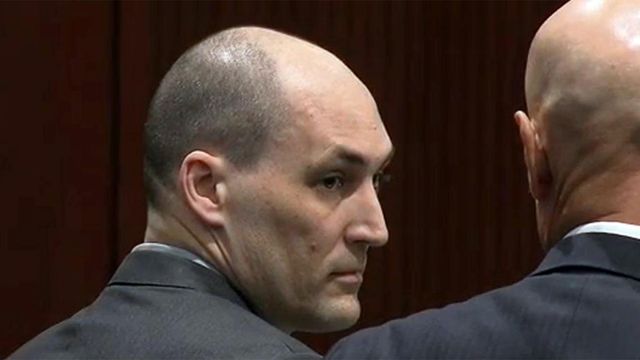Family: Relief, closure with Brad Cooper's guilty plea
Brad Cooper pleaded guilty Monday to second-degree murder in the July 2008 death of his wife Nancy Cooper - a move that not only means freedom for him within the next six years but also brings her family long sought-after relief.
Posted — UpdatedBradley Graham Cooper, 40, was sentenced to 12 to 15 years – 145 to 183 months – in prison with credit for time served since his arrest in October 2008 for Nancy Cooper's July 12, 2008, death.
The 34-year-old mother-of-two's body was found two days later in an unfinished housing development about 3 miles from the couple's home in Cary's Lochmere neighborhood.
Brad Cooper – who always maintained that his wife went jogging and never returned home – appealed his 2011 first-degree murder conviction and last year won a new trial.
With a new defense team, however, he accepted blame Monday, only answering "yes" to Superior Court Judge Paul Gessner's questions about the crime.
Nancy Cooper's father, Garry Rentz, said his former son-in-law's admission has brought some closure to the family and allows them to now move on with their lives.
"When we started this process years ago, I said I wished the person responsible for this crime would come forward and acknowledge guilt and own up to their behavior," he said. "That's happened today."
The plea – in which Brad Cooper relinquished his parental rights – also makes way for Nancy Cooper's twin sister in Canada to adopt the Coopers' two daughters – now ages 8 and 10.
"It's amazing. It's total relief. He doesn't deserve them," said Krista Lister, who has had custody of the girls since their mother's death. "He doesn't deserve to know them, and I'm very happy about it."
Accepting what happened to their mother has been difficult for the children, Lister said, with the oldest taking it especially hard.
"They're doing good (now). They know what happened with Nancy – Bella especially. That destroyed her for many years," Lister said. "She's gotten over it."
Gessner, who presided over the high-profile trial in 2011, had harsh words for Brad Cooper.
"It just bothers me that you have an individual who will, apparently, bargain away their rights as a parent," Gessner said. "I find that repulsive."
A case of domestic violence
The Coopers, who moved from Canada to North Carolina in 2001, were having money problems and trust issues in their seven-year marriage after Brad Cooper admitted to having an affair.
Witnesses testified at trial – one of the longest and most expensive non-capital cases in Wake County – that Nancy Cooper was seeking a divorce and planning to return to Canada with their girls.
Initially, Brad Cooper supported the move, but after finding out about the financial terms of a proposed separation agreement, he became controlling, cut off Nancy Cooper's access to their bank and credit card accounts and monitored her phone calls and emails.
"What he did was prevent her from leaving, for among other reasons, because it was going to cost too much," Cummings said.
At trial, defense attorneys argued that there was no history of violence in the couple's relationship and that Cary police investigators' work was "dishonest" and "inept" because they never looked beyond Brad Cooper as a suspect.
The state's case was mostly circumstantial with the exception of Internet files on Brad Cooper's laptop of a Google Maps search that state computer experts said was made the day before Nancy Cooper disappeared.
That was the basis of last year's North Carolina Court of Appeals decision that Brad Cooper should receive a new trial. The appellate panel found that Gessner should have allowed the defense to call experts to support their theory that someone had tampered with the laptop.
Getting the last word Monday, Cummings said it would have been impossible for someone to hack into the computer, given the time it would have required.
He also publicly praised Cary police for their work on the case.
"They got run through the mill the likes I've never seen," Cummings said. "They are very professional. They did things exactly the way they needed."
Related Topics
• Credits
Copyright 2024 by Capitol Broadcasting Company. All rights reserved. This material may not be published, broadcast, rewritten or redistributed.





